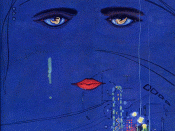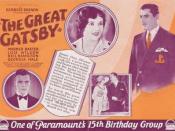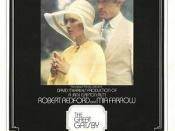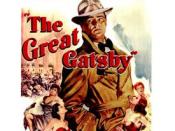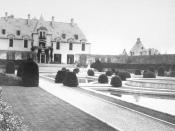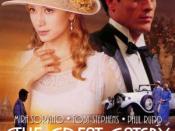Critical Analysis The glistening world of the elite of the Roaring Twenties concealed the corruption that festered at the heart of the age. The only one within the "circle"ÃÂ that remained untainted was Gatsby. Gatsby had drive and ambition, characteristics that were unpalliatable and foreign to the tongue of the society that he was desperately trying to blend with. He masked this "flaw"ÃÂ by throwing extravagant parties, by talking with obvious correctness, and buying the most expensive, gaudy clothes. Unfortuanately for him, he would never fit in. Oddly enough, it was those very characteristics that attracted Nick to Gatsby.
At this time in history the American Dream idealism was very big, and it would seem as though Fitzgerald was trying to compare the American dreamer with the old-money society. Showing what could happen with hard work and drive, we have Gatsby. A man who can from nothing, out of nowhere, who worked hard and prospered.
This was the central idea for the whole movement. Then Fitzgerald does something surprising, he takes this golden dream and sours it. We are shown the downside, and foreshadowing downfall of the ill-fated dreamers. It is American tradition to celebrate the highly successful businessmen, thrusting the most outstanding on pedastals of gold, but Fiztgerald shines the light on the corruption of the 1920's society. He doesn't do it only once, but twice, to reinforce the point, so we will pick it up.
Dan Cody is "a product of the Nevada siver fields, of the Yukon, of every rush of metal since seventy-five."ÃÂ(105) Now to be a successful miner you have to physically work hard, Dan Cody did and he prospered, he became a millionaire. Then he dies, alone, intoxicated, and betrayed, the fate of a dreamer. He wasn't remembered, he was good as long as he had his money, then he was forgotten. Society's misuse of the dreamer is evident here, but at a smaller, less important scale, it is used as a foreshadow, predicting the death of Gatsby in a likewise manor because of the two stories coincedences.
We are to take Dan Cody's life and follow the pattern all the way through Gatsby's. Gatsby starts out in a small town in Minnesota, yet he dreams of becoming something bigger and greater, he works hard and essentially achieves his goals. He befriends someone who is less rich than himself, like Dan Cody did with him. He is used by the society for his money, but always remains on the outside of it. " Girls were putting their heads on men's shoulders in a puppyish, convivial way, girls were swooning backward playfully into men's arms, even into groups, knowing that someone would arrest their falls-but no one swooned backward on Gatsby and no French bob touched Gatsby's shoulder and no singing quartets were formed around Gatsby's head for one link"ÃÂ.(55) We can see how they mooch off his money, not making any attempt for him to feel accepted or part of them, even at his own parties. He dies basically alone, none of the people who paraded around his home went to his funeral.
Fitzgerald also reveals to us that the society was unable to fulfill the dreamer's actual dream. Gatsby had wanted to be rich and to flow into the rich circles. We realize that altough he was able to get rich, the Sloans and Tom are utterably disrespectful. Mrs. Sloan invited him to dinner, but when he goes to get his coat they uninvite him to Nick then ride off before he could get outside. This is where the issue of "new money"ÃÂ vs. "old money"ÃÂ comes into play. All his parties and clothes won't allow him into the circles. Daisy won't even marry him because to her he isn't reputable, even though he is richer than most of the people in East Egg. He worked for five years to reach a status good enough for her, not realizing that it would never be good enough, she had also been corrupted by this superficial society. His dream of marrying her never comes true. He dreams of her for so long that reality and fantasy blend somewhere and Nick picks up on the fact that perhaps he realizes that she wasn't everything he thought her to be. "There must have been many times that afternoon when Daisy tumbled short of his dreams. No amount of fire or freshness can challenge what a man stores up in his ghostly heart."ÃÂ (101) We are shown the unhappiness that lurks under the gaiety and it should make us a little sad for their misconceptions. Daisy even got drunk to blind herself from the unhappy future in store for her. They seem to know that there was immenent danger and either didn't care or ignored it. Fitzgerald knows something is going to happen because of this carelessness, and perhaps he predicts it to us. It was the thirties that the downfall of this society happened and at the height of the book Nick says, "I just remembered, this was my birthday. I was thirty. Before me stretched the portentous menacing road of a new decade"ÃÂ(143)
